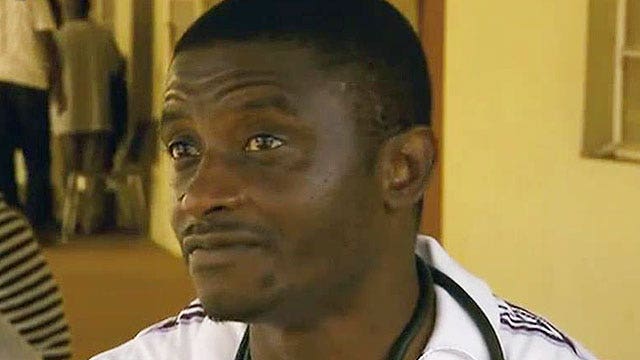Doctor being treated for Ebola dies in Nebraska hospital
Advanced symptoms of virus kill surgeon
A surgeon who contracted the Ebola virus while working in Sierra Leone died Monday at a Nebraska hospital where he was being treated in a biocontainment unit, the facility said in a statement.
A statement released Monday by Nebraska Medical Center said Dr. Martin Salia "has passed away as a result of the advanced symptoms of the disease." Hospital spokesman Taylor Wilson said Salia died shortly after 4 a.m. Monday. Salia's body will be cremated, Dr. Phil Smith, medical director of the biocontainment unit said in a press conference.
Salia, 44, was being treated in the medical center's biocontainment unit after arriving Saturday by plane from West Africa. He was transported by ambulance to the hospital, where two other Ebola patients have been successfully treated. On Sunday officials had described his condition as "an hour-by-hour situation."
"Dr. Salia was extremely critical when he arrived here, and unfortunately, despite our best efforts, we weren't able to save him," Smith said. Salia was placed on dialysis, a ventilator and given several medications to support his organ systems. He was given the experimental drug ZMapp on Saturday. He also received a plasma transfusion from an Ebola survivor -- a treatment that is believed to provide antibodies to fight the virus. Hospital officials declined to identify the donor.
The first two Ebola patients to return to the U.S., Dr. Kent Brantly and Nancy Writebol, were treated with ZMapp in August. Their treatments exhausted that supply of ZMapp and Salia was treated using a new batch of the drug.
"We used every possible treatment available to give Dr. Salia every possible opportunity for survival," Smith said. "As we have learned, early treatment with these patients is essential. In Dr. Salia's case, his disease was already extremely advanced by the time he came here for treatment."
Salia had been working as a general surgeon at Kissy United Methodist Hospital in the Sierra Leone capital of Freetown. It's not clear whether he was involved in the care of Ebola patients. Kissy is not an Ebola treatment unit, but Salia worked in at least three other facilities, United Methodist News said, citing health ministry sources.
Salia, a Sierra Leone citizen who was a permanent resident of the U.S. and lived in Maryland, first showed Ebola symptoms on Nov. 6 but tested negative for the virus. He eventually tested positive on Monday. Smith called the initial test results "not unusual."
Salia's wife, Isatu Salia, said that she and her family were grateful for the efforts made by her husband's medical team.
"We are so appreciate of the opportunity for my husband to be treated here and believe he was in the best place possible," Salia said.
The U.S. State Department said it helped facilitate the transfer of Salia; the U.S. Embassy in Freetown said he paid for the expensive evacuation. The travel costs and care of other Ebola patients flown to the U.S. have been covered by the groups they worked for in West Africa.
Salia and his wife have two children, ages 12 and 20. Isatu said in a telephone interview that she spoke to her husband early Friday and his voice sounded weak and shaky. But he told her "I love you" in a steady voice, she said.
Two other Ebola patients have been successfully treated at the Omaha hospital. Of 10 people to be treated for the disease in the United States, all but two have recovered. Thomas Eric Duncan, of Liberia, died at a Dallas hospital in October.
Ebola has killed more than 5,000 people in West Africa, mostly in Liberia, Guinea and Sierra Leone. Five other doctors in Sierra Leone have contracted Ebola, and all have died.
The Associated Press contributed to this report.

